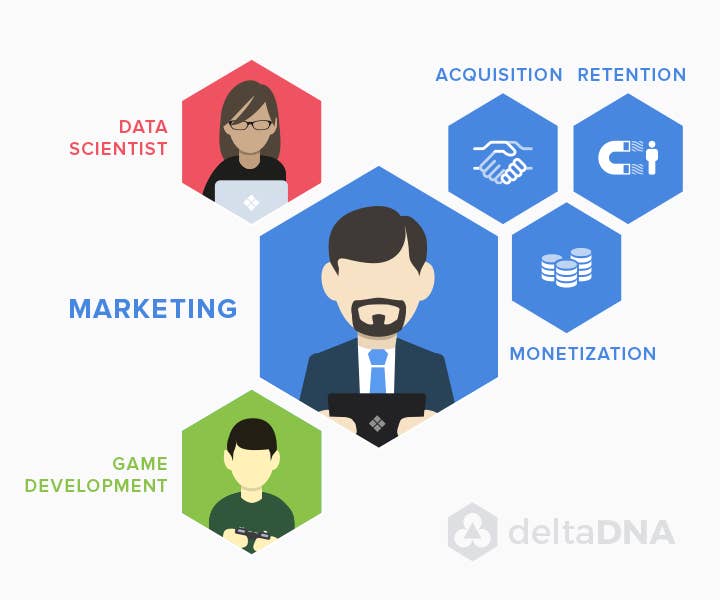How data has redefined the role of the game marketer
And the importance of accurate metrics for better design
It wasn't so long ago that game design was informed primarily by market research and the insight - credible or otherwise - of the design team. Now, that takes second place to the reams of live, in-depth data tracking that monitors every step players take. Being able to monitor and respond to real-time insight has transformed the design process, and with it the way games are marketed.
Previously, the marketing function sat outside the development team and worked with what it was given; now, forward-looking companies have brought marketing into the heart of the development process. The explosion of the F2P model has gone hand-in-hand with the availability of data and the strategic role that marketing now enjoys, but are publishers and developers up-to-speed with this paradigm shift?
Start by knowing your data
According to Andrea Casalinga, Vice President of Marketing at games distributor Craduga GmbH, the marketing department is in charge of all activities surrounding the game, user acquisition, advertising and retention relating to user engagement. In Cadruga, data science is front and center to game development strategy and drives marketing activity. "From UA to retention, the main need is to have 'scientists' analyzing numbers," Casalinga said. "A role that is now mandatory in any game is Business Intelligence."
"Every game has hundreds of thousands of tracking calls to make sure every change is in the right direction. Here, the key is testing. Within my department we test every small detail against a small variation or againsttaking a completely different approach. Testing is the best way of finding solutions and making improvements."

Magnus Alm, Head of External Games and former CMO at group messenger and community gaming app company, Palringo, agrees. He said Palringo has been metrics-driven since its inception, but it has recently been working hard at refining its tools for analytics.
"We are trying to make sure that we, as a company, have a common understanding of the behavior of our users and how they react to our products, updates, and overall user experience," Alm said. "The product owners are deeply engaged with the metrics, and make sure that the priority of tasks for development sprints are based on facts rather than assumptions. Our Performance Marketing Manager is also constantly digging down into the data, looking at both channels and game performance, so we can effectively refine our marketing approach as needed."
Boundaries blur
Integration and communication between teams has developed as boundaries between activities blur and converge. Acquisition and monetization have become two sides of the same coin, with player engagement and retention driving the value derived from both activities.
Christian Calderon, Head of Marketing at mobile game studio We Play Dots, explains this by saying that his studio requires full-time marketing support on both in-game monetization and marketing outside the game. "Because a developer is often working with the same channel partners on the monetization side as they are on the user acquisition side, these two efforts work hand-in-hand and function best, for this studio, under the same group that is running user acquisition".
"cross-team communication is the feedback lubricant for superior data-driven design, and we believe that great businesses are built on healthy cross-team communication between marketing and product teams"
John Welch, CEO of Making Fun, makes the point that today's freemium economic environment requires continuous product improvement based on dynamic behavioral user data and cross-team communication.
"In this pursuit, cross-team communication is the feedback lubricant for superior data-driven design, and we believe that great businesses are built on healthy cross-team communication between marketing and product teams," Welch said. "We also believe that it is the entire company's responsibility to develop fun and engaging products, and to drive awareness for these products to millions of people all over the world, we are all delineated within that objective."
Marketing as an insight hub
The role of the marketer has expanded into new and previously unchartered realms, such as game development. Because marketing is now taking a more central role; receiving and interpreting game data across acquisition, retention, and monetization, the next logical step is for the marketer to feed this insight into the development of new games.
Margeaux Sullivan, co-founder of Quest Complete Consulting, has watched the evolution of game marketing first-hand, into a more central data-driven role that involves utilizing insight provided by the data scientists to inform the value propositions of new games developed by marketers.
"As a marketer, it's important to work closely with developers to understand their vision of the game and to discuss how they will differentiate this game from others in the genre," Sullivan said. "It's also important to keep in constant communication with analysts, because they provide context and visualization of raw data, they contribute to and test theories, and they steer the team towards fact-based decision making, and they encourage a meaningful interpretation of data rather than a hunch. The developers decide which game mechanics are compelling, and the analysts reveal whether the community agrees."
"In recent years we've seen the role of the marketer develop across all areas of the game, from acquisition and retention through to monetization"
With the evolution of the mobile games industry into a saturated freemium market, the marketer is no longer a single role, but rather one that permeates all aspects of the game.
Mark Robinson, CEO at deltaDNA said, "In recent years we've seen the role of the marketer develop across all areas of the game, from acquisition and retention through to monetization. This expansion has been driven by the increased availability of detailed data, the employment of data scientists, and the marketers' centralized role in interpreting and acting on data.
"It's now of primary importance to marketers that they have access to rich data plus the advanced tools required to help them understand player engagement for themselves, run tests, create detailed player segments, and generate intelligent player interactions.
The future, as we see it at deltaDNA, lies in the collection of all player data into a single environment and the creation of powerful tools for marketers to analyze, test, and monetize, particularly in F2P where marginal improvements can be the difference between profit and loss."
This type of data has become even more important to marketers, as they continue to evolve with the burgeoning mobile game industry.
"This article was commissioned as promotional material by DeltaDNA and does not necessarily represent the views of GamesIndustry.biz."
